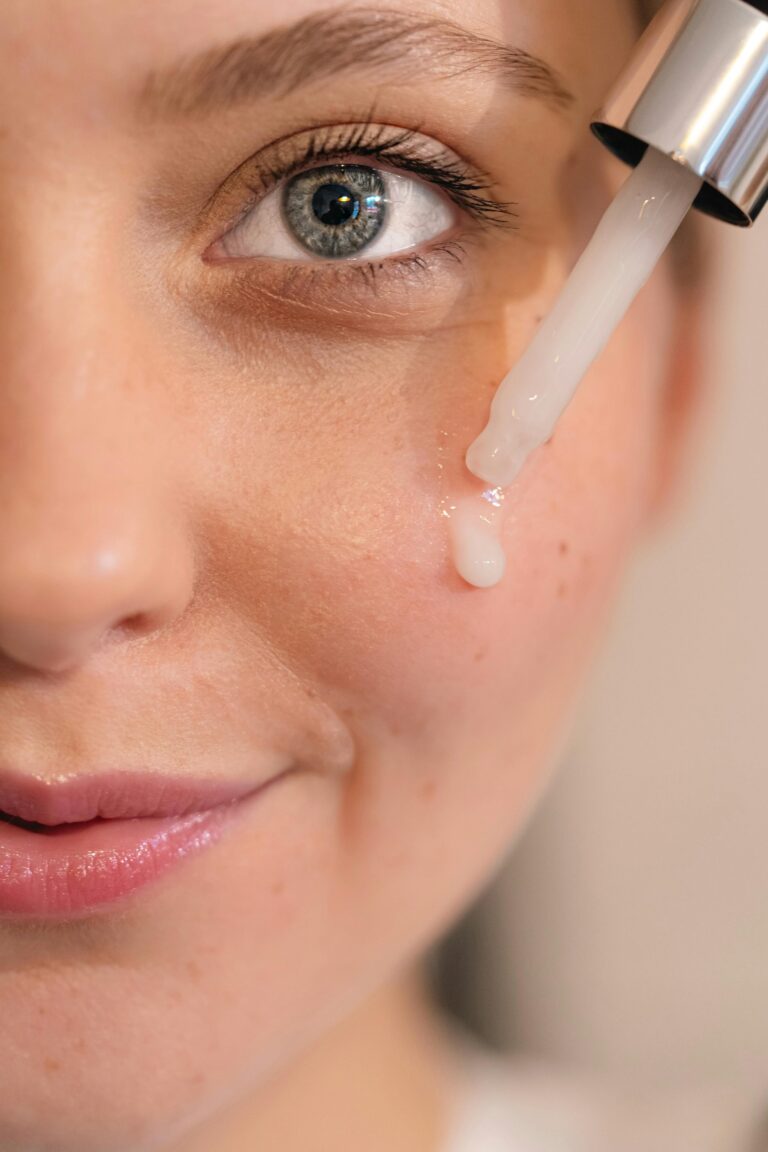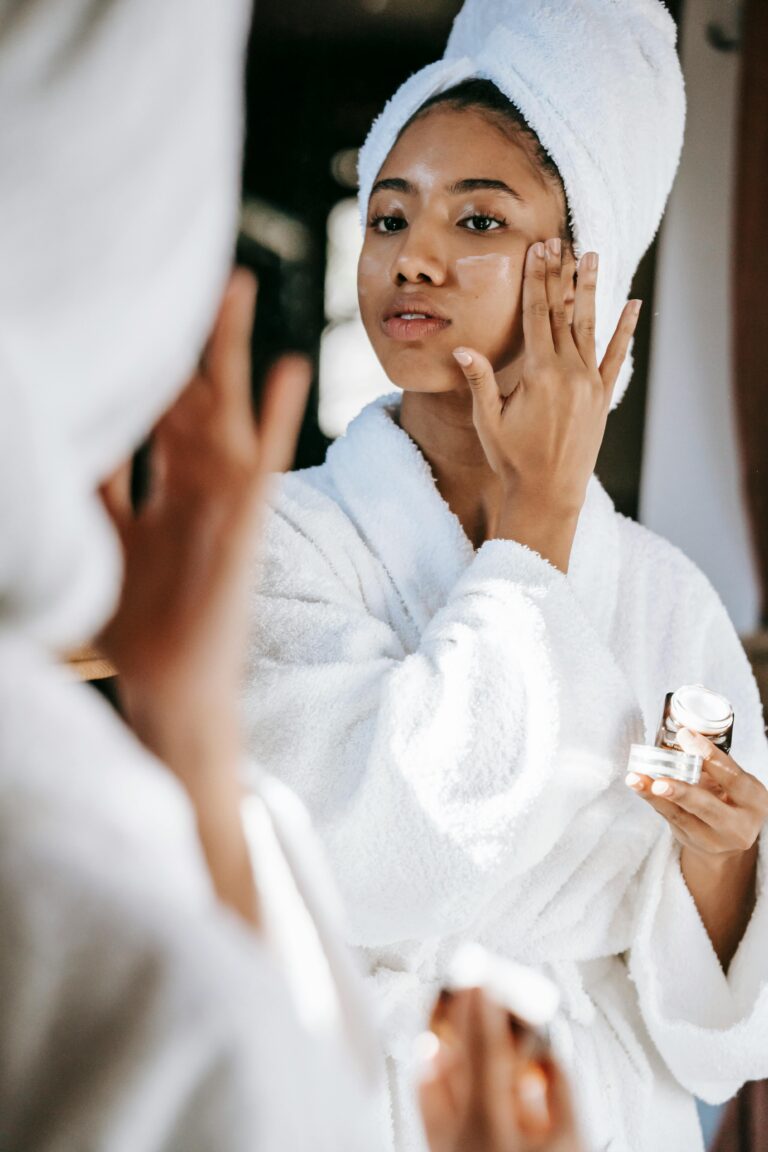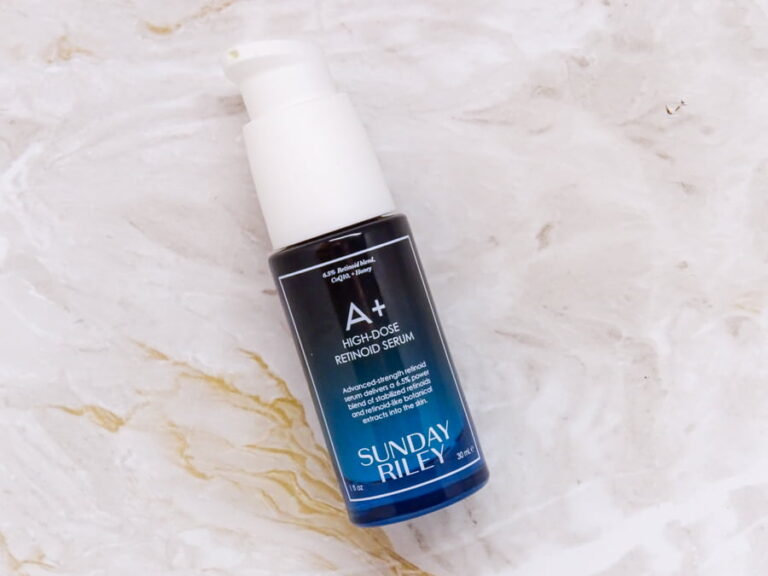The 7 Benefits Of Olive Oil For The Skin: Unlock Radiant Complexion
Do you want to nourish your skin and keep it looking young? Olive oil is a natural wonder that can be used for many skin benefits. It’s not just for cooking! But what exactly are the benefits of olive oil for the skin?
Rich in vitamins, minerals, and antioxidants, this liquid gold has been a staple in beauty routines for centuries. Read on to uncover the amazing advantages of olive oil for your skin and why you should consider adding it to your skincare routine!
What Is Olive Oil?
Olive oil is a type of vegetable oil that is obtained by pressing the fruit of the olive tree. It is a staple ingredient in Mediterranean cuisine and is widely used in cooking, as well as in skincare products.
Olive oil has been produced for thousands of years, primarily in countries surrounding the Mediterranean Sea, such as Greece, Italy, Spain, and Turkey. Today, it is also produced in other parts of the world, including the United States, Australia, and South Africa.
There are several different types of olive oil, each with its own unique flavor and aroma. Here are some of the most common types of olive oil:
- Extra virgin olive oil: This is the highest quality and most flavorful type of olive oil. It is made from pure, cold-pressed olives and contains no more than 0.8% acidity.
- Virgin olive oil: This is also made from pure, cold-pressed olives, but it has a slightly higher acidity level (up to 2%). It has a slightly less intense flavor than extra virgin olive oil.
- Olive oil: This is a blend of virgin olive oil and refined olive oil. It has a milder flavor than pure olive oil and is often used for frying and cooking.
- Pure olive oil: This is a blend of refined olive oil and virgin olive oil. It has a neutral flavor and is often used for high-heat cooking.
- Light olive oil: This is a very mild-tasting oil that has been heavily refined. It is often used for baking and cooking.
In addition to these types of olive oil, there are also flavored olive oils infused with herbs, spices, or other ingredients. Flavored olive oils are often used as a finishing oil, drizzled over dishes just before serving.
On top of that, olive oil is also used in different ways regarding skincare. Here are some forms of olive oil that are commonly used in skincare:
- Extra virgin olive oil: This type of olive oil is often used in skincare products because it is rich in antioxidants, which can help protect the skin from damage caused by free radicals. It is also high in oleic acid, a fatty acid that helps to moisturize and nourish the skin.
- Olive oil extract: This is a concentrated form of olive oil often used in skincare products for its anti-aging benefits. Olive oil extract is rich in polyphenols, which are powerful antioxidants that can help reduce fine lines and wrinkles.
- Olive oil soap: Olive oil is a common ingredient in natural soaps because it is gentle on the skin and helps to moisturize and nourish it. Olive oil soap is often recommended for people with dry or sensitive skin.
- Olive oil moisturizer: Olive oil moisturizers are often used to hydrate and nourish the skin. Olive oil is high in vitamin E, which can help to protect the skin from damage caused by UV radiation and environmental pollutants.
- Olive oil lip balm: Lip balms that contain olive oil are often used to moisturize and protect the lips. Olive oil is rich in fatty acids that can help to prevent moisture loss and keep the lips soft and supple.
It is important to note that not all olive oils are equal in terms of their skin benefits. Extra virgin olive oil, which is obtained from the first cold pressing of the olives and has not undergone any chemical or heat treatments, is the most beneficial type of olive oil for the skin.
It is important to choose high-quality extra virgin olive oil that is certified organic and cold-pressed for optimal skin benefits.
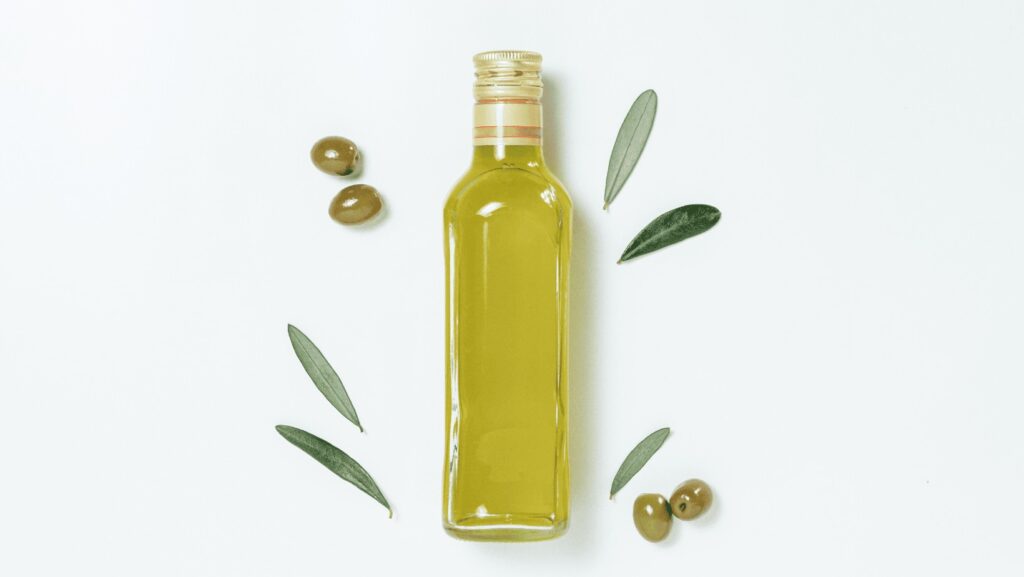
Benefits Of Olive Oil For The Skin
Olive oil has been used as a skincare remedy for centuries and is still widely used today. Here are some of the potential benefits of using olive oil on the skin:
- Moisturizes the skin: Olive oil is rich in fatty acids and squalene, which can help to moisturize and nourish the skin. It can also help to improve skin elasticity and prevent moisture loss.
- Protects against environmental damage: Olive oil contains antioxidants, such as polyphenols and vitamin E, which can help to protect the skin from damage caused by UV radiation and environmental pollutants.
- Soothes and calms the skin: Olive oil has anti-inflammatory properties, which can help to reduce skin redness, irritation, and inflammation.
- Improves skin texture: Regular use of olive oil may help improve skin texture and tone. It can also help to reduce the appearance of fine lines and wrinkles.
- May help to treat certain skin conditions: Olive oil has been shown to have antibacterial and antifungal properties, which may help to treat skin conditions such as acne, eczema, and psoriasis.
- May help to prevent signs of aging: Olive oil is rich in antioxidants, which can help to protect the skin from damage caused by free radicals and reduce the appearance of fine lines and wrinkles.
- Can be used as a natural makeup remover: Olive oil can be a gentle and effective makeup remover, as it can help dissolve makeup and impurities without stripping the skin of its natural oils.
It’s important to note that these benefits are based on anecdotal evidence and may not apply to everyone. If you have a skin condition or are prone to skin allergies, it’s always best to speak with a dermatologist before using olive oil or any other new skincare product.
Moisturizes The Skin
Olive oil is a rich source of fatty acids and squalene, which are both excellent moisturizers. Fatty acids help to create a barrier on the skin’s surface, preventing moisture loss and keeping the skin hydrated.
Squalene is a natural compound that is produced by the skin’s sebaceous glands and helps to keep the skin soft and supple.
However, as we age, the production of squalene decreases, which can lead to dry, rough skin. Using olive oil on the skin can help to replenish squalene levels and improve the skin’s moisture content.
Protects Against Damage
Olive oil contains powerful antioxidants, such as polyphenols and vitamin E, which can help to protect the skin from damage caused by UV radiation and environmental pollutants.
UV radiation can cause skin damage, including premature aging and an increased risk of skin cancer. Environmental pollutants, such as cigarette smoke and air pollution, can also cause oxidative stress and damage to the skin.
Using olive oil on the skin can help to neutralize free radicals and protect the skin from damage.
Soothes And Calms The Skin
Olive oil has anti-inflammatory properties, which can help to reduce skin redness, irritation, and inflammation.
This makes it a great option for people with sensitive skin or inflammatory skin conditions, such as eczema or psoriasis. Olive oil can help to soothe the skin and reduce the appearance of redness and irritation.
Improves Skin Texture
Regular use of olive oil on the skin can help to improve skin texture and tone. The fatty acids in olive oil can help to nourish and hydrate the skin, while the antioxidants can help to reduce oxidative stress and improve skin elasticity.
This can help to reduce the appearance of fine lines and wrinkles and leave the skin looking smoother and more youthful.
Treat Skin Conditions
Olive oil has been shown to have antibacterial and antifungal properties, which may help to treat skin conditions such as acne, eczema, and psoriasis.
These properties can help reduce inflammation and fight off harmful bacteria and fungi contributing to skin problems.
Anti-Aging Properties
Olive oil is rich in antioxidants, which can help to protect the skin from damage caused by free radicals. Free radicals are unstable molecules that can damage cells and contribute to aging.
By neutralizing free radicals, antioxidants can help to prevent signs of aging, such as fine lines and wrinkles.
Natural Makeup Remover
Olive oil can be used as a gentle and effective makeup remover, as it can help to dissolve makeup and impurities without stripping the skin of its natural oils.
This can be especially beneficial for people with dry or sensitive skin, as conventional makeup removers can be harsh and dry.
Using olive oil as a makeup remover can help to keep the skin hydrated and nourished while effectively removing makeup and impurities.
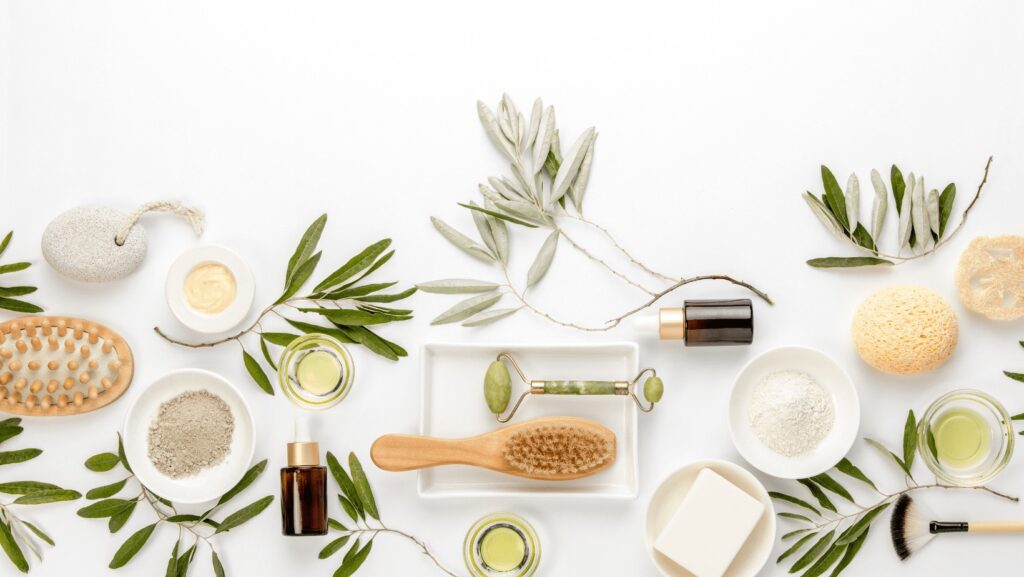
How To Use Olive On Your Skin
Olive oil has a variety of uses for your skin, as it is packed full of antioxidants and vitamins. If you use natural olive oil, it’s best to apply olive oil on your skin and massage a small amount onto the desired area in soft circular motions until fully absorbed.
Another way is buying products with olive oil infused. How to use these products depends on the product and the brand’s instructions, but it isn’t going to be much different from how you should use natural olive oil.
Getting The Most Out Of Olive Oil For The Skin
Olive oil has been used for centuries as a natural remedy to soothe the skin. To maximize its effectiveness, you should use extra virgin olive oil that is cold-pressed and of the highest quality.
Apply it directly onto your face or body with gentle circular motions until it’s fully absorbed by your skin. You can also combine it with other ingredients like honey or sugar for added benefits, depending on what type of treatment you’re looking for!
Eating Olive Oil Benefits For Skin
Not only does olive oil have benefits for your skin when applied topically, but olive oil has also several health-related benefits[1]. But you might be wondering if eating olive oil is also beneficial for your skin or if you really have to apply it to the face/skin for it to have an effect.
The answer is yes[2]. You will see the benefits of olive oil for the skin, too, when consumed instead of topically applied. Both methods work!
Potential Disadvantages Of Olive Oil On Face
The potential side effects on the skin when using olive oil are mild, but it is important to be aware of them. Olive oil can cause some people to experience a light rash or redness due to its acidic nature.
Another possible reaction is contact dermatitis, which may occur if you have sensitive skin and use too much oil. If any of these symptoms appear after applying olive oil, it would be wise to discontinue use and consult with your doctor immediately.
Alternatives To Using Olive Oil On The Skin
Olive oil is a great natural solution for moisturizing the skin, but for those who are looking for alternatives, there are plenty to choose from.
Coconut oil is an excellent option due to its anti-inflammatory and antibacterial properties; it makes a great face wash or body scrub in place of olive oil.
Sweet almond and avocado oils can also be used as gentle cleansers that will leave your skin feeling soft and hydrated.
And if you’re looking for something lighter than oil, try using aloe vera gel instead – full of antioxidants, it’s perfect for soothing dry or irritated skin.
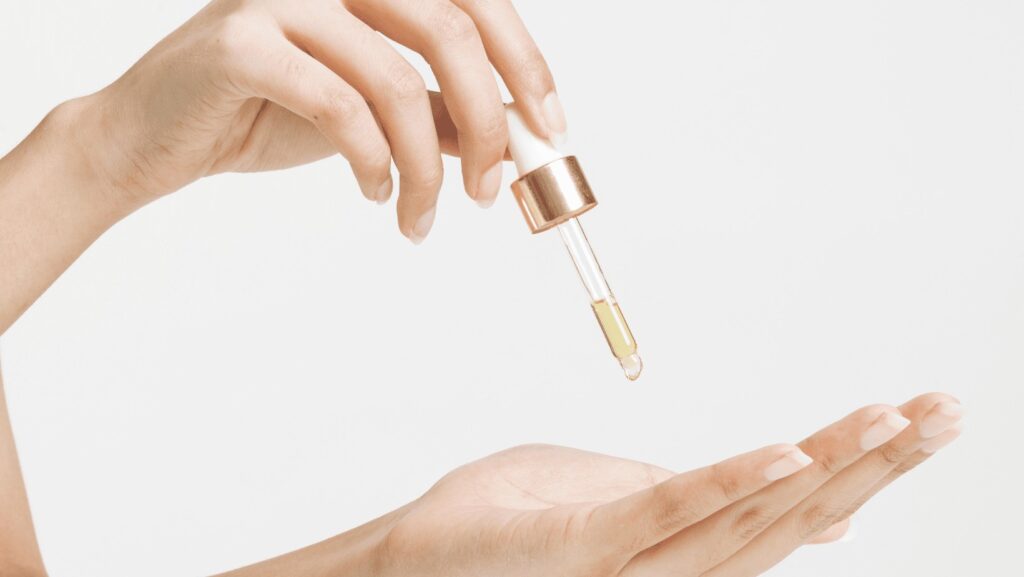
Conclusion On Benefits Of Olive Oil For The Skin
Olive oil is a beneficial ingredient for the skin in many ways. Its high content of antioxidants, fatty acids, and vitamins makes it an excellent natural moisturizer, which can improve skin elasticity, hydration, and texture.
Olive oil is also known for its anti-inflammatory properties, which can help reduce redness, irritation, and inflammation associated with skin conditions such as acne, eczema, and psoriasis.
Additionally, olive oil has been used in traditional medicine for centuries to treat various skin conditions, such as burns, insect bites, and rashes.
Overall, incorporating olive oil into your skincare routine can provide numerous benefits for your skin. Whether you use it as a moisturizer, massage oil, or as a key ingredient in your DIY skincare products, you can enjoy its antioxidant, anti-inflammatory, and moisturizing properties for healthy and radiant skin.
Frequently Asked Questions


